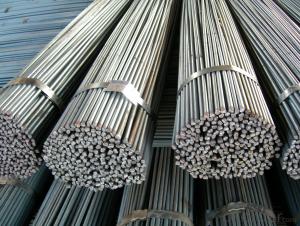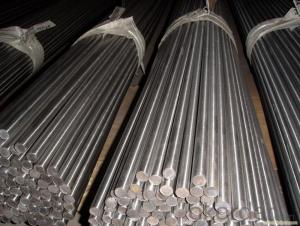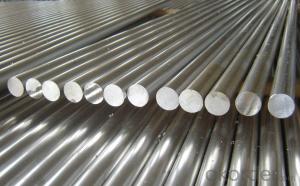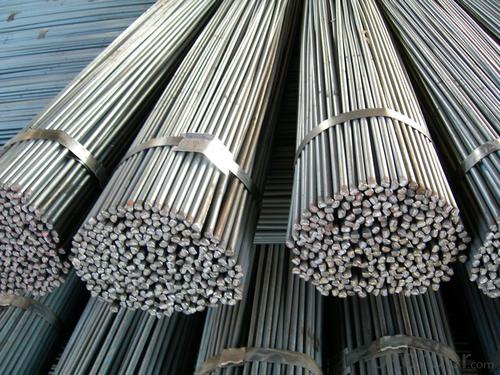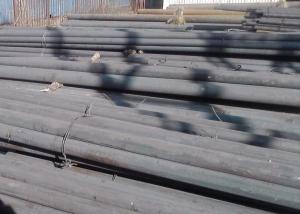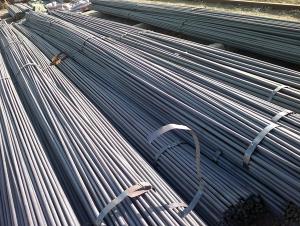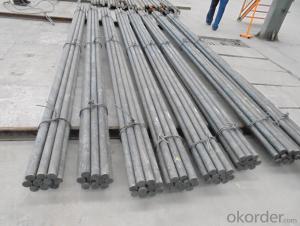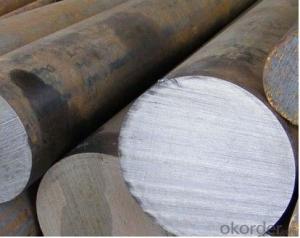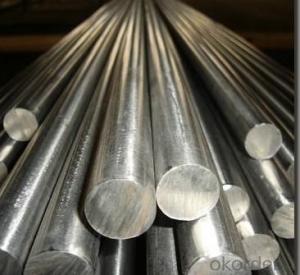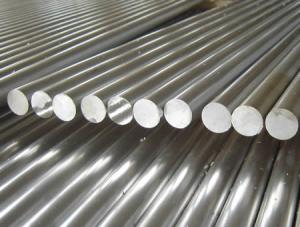High quality round bar 5-100
- Loading Port:
- China Main Port
- Payment Terms:
- TT OR LC
- Min Order Qty:
- -
- Supply Capability:
- -
OKorder Service Pledge
OKorder Financial Service
You Might Also Like
Product Description:
High Quality Round Bar Details:
| Minimum Order Quantity: | 25 Tons | Unit: | m.t. | Loading Port: | Tianjin |
| Supply Ability: | 500 Tons Per Day | Payment Terms: | TT or L/C | | |
Product Description:
Specifications of High Quality Round Bar
1. Grade: GB, JIS, ASTM, EN
2. Grade: Q235, SS400, A36, S235JR
3. Diameter and mass: As below
Diameter | Mass | Diameter | Mass | Diameter | Mass |
(mm) | (kg/m) | (mm) | (kg/m) | (mm) | (kg/m) |
6 | 0.22 | 22 | 2.98 | 53 | 17.30 |
7 | 0.30 | 24 | 3.55 | 56 | 19.30 |
8 | 0.40 | 25 | 3.85 | 60 | 22.20 |
9 | 0.50 | 26 | 4.17 | 63 | 24.50 |
10 | 0.62 | 28 | 4.83 | 65 | 26.00 |
11 | 0.75 | 30 | 5.55 | 70 | 30.20 |
12 | 0.89 | 32 | 6.31 | 75 | 34.70 |
13 | 1.04 | 34 | 7.13 | 80 | 39.50 |
14 | 1.21 | 36 | 7.99 | 85 | 44.50 |
15 | 1.39 | 38 | 8.90 | 90 | 49.90 |
16 | 1.58 | 40 | 9.86 | 95 | 55.60 |
17 | 1.78 | 42 | 10.90 | 100 | 61.70 |
18 | 2.00 | 45 | 12.50 | 120 | 88.85 |
19 | 2.23 | 48 | 14.20 | 140 | 120.93 |
20 | 2.47 | 50 | 15.40 | 150 | 138.82 |
4. Material: Mild Steel
5. Heat treatment of high quality steel:
Fire: Isothermal annealing temperature is 800 ~ 880 °C, with 10 ~ 20 °C, the furnace cooling to about 600 °C, hardness above HB269.
Preheat temperature: 730-730 °C
Quenching temperature: 1190-1210 °C
Tempering temperature: 540-595 °C
Cold drawn, hardness 285 HBS
Cold drawn after annealing condition, hardness 277 HBS
Quenching methods: oil quenching, air cooling or salt bath quenching
Usage and Applications of High Quality Round Bar
1) Suitable for making various strong cutting tool abrasion resistance, impact resistance.
2) Used to produce all kinds of high hard and super hard saw blade, drill, tap, broach, gear hob and various kinds of milling cutter.
3) Used for advanced punching die, screw die, and the toughness and complicated shape of the punch, etc.
4) Is used for cold forging die and drawing mode, etc.
5) Recommended watchcase factory, screw factory and other cold stamping products industry use.
Packaging & Delivery of High Quality Round Bar
Packaging Detail: All goods are packed in bundle with steel strips and shipped by break bulk vessel or container (depend on target market and different ports)
Delivery Detail: 45 days
Trade terms: FOB, CFR, CIF
MOQ: 25 tons per specification; we can negotiate the quantity if the specification is normal or we have stock of one specification.
Weight: Theprice invoicing on theoretical weight basis or actual weight basis depends on customer’s request.
Shipment: The shipment of bulk break or container is depends on customer’s request and the situation of the port of destination.
Documents given: Full set of original clean on board bill of lading; Original signed commercial invoice; Original packing list; Policy of insurance; Certificate of origin and what the target market needs.
Production Flow of High Quality Round Bar
The common processes are preheated forging quenching, dual refinement solution process, cooling quenching and isothermal quenching. We use heat treatment for dual refinement solution process. The main measures process is high temperature solution and refinement cycle. High temperature solution can improve the carbide morphology and particle size. The aim is to make the loop refinement ultrafine austenite grains
- Q: Why is it better to use round steel than flat steel in lightning protection?
- Of course, the contact area of flat steel and soil are large, relatively scattered large flow area, the construction is more convenient, in terms of price, we are willing to use flat, as for the problem of anti-corrosion, anti-corrosion paint, zinc can be taken, you know, the thickness of galvanized steel pipe is generally not flat, so true to see the term for the use of galvanized flat steel is not bad.
- Q: Can steel round bars be coated or plated?
- Yes, steel round bars can be coated or plated using a variety of methods such as electroplating, hot-dip galvanizing, or powder coating. Coating or plating steel round bars helps to enhance their corrosion resistance, improve their appearance, and provide additional durability and protection.
- Q: How are steel round bars measured and specified?
- The diameter is utilized to measure and specify steel round bars. Typically, the diameter of a round bar is measured in millimeters or inches. The measurement is taken at the widest point of the circular cross-section. When it comes to specification, steel round bars are commonly specified by their diameter and length. For instance, a steel round bar can be specified as "25mm diameter x 3 meters length". This indicates that the bar has a diameter of 25mm and a length of 3 meters. Moreover, steel round bars can also be specified based on their tolerance, surface finish, and grade. Tolerance refers to the allowable deviation from the specified diameter. Surface finish pertains to the quality of the bar's surface, which can vary from rough to smooth. Grade signifies the quality and composition of the steel utilized to produce the round bar, such as mild steel, carbon steel, or alloy steel. Accurate measurement and specification of steel round bars are crucial to ensure that they meet the necessary dimensions and properties for a specific application.
- Q: Can steel round bars be used for making bicycle frames?
- Yes, steel round bars can be used for making bicycle frames. Steel is a commonly used material in bicycle frame construction due to its strength, durability, and affordability. Steel round bars can be easily shaped and welded to create the desired frame design, making them a suitable choice for bicycle manufacturing.
- Q: Can steel round bars be used in the manufacturing of jewelry?
- Yes, steel round bars can be used in the manufacturing of jewelry. However, steel is not a common material choice for jewelry due to its hardness and lack of malleability. Other metals such as gold, silver, and platinum are more commonly used for their aesthetic appeal and ability to be easily shaped into intricate designs.
- Q: Can steel round bars be used in the defense industry?
- Indeed, in the defense industry, steel round bars find utility. Steel, being a remarkably resilient and sturdy substance, proves fitting for diverse applications within the defense sector. The production of vital defense equipment, such as gun barrels, armor plates, missile casings, and other essential components, can be achieved using steel round bars. The durability of steel guarantees that these components endure high-pressure circumstances and furnish the essential safeguard and assistance demanded in defense applications. Moreover, steel round bars can be customized through machining, welding, or heat treatment to fulfill the distinct necessities of various defense systems, rendering them a material choice ideally suited for the industry.
- Q: Can steel round bars be used in the manufacturing of agricultural equipment?
- Yes, steel round bars can be used in the manufacturing of agricultural equipment. Steel is a strong and durable material that provides the necessary strength and structural integrity required for agricultural machinery. It is commonly used in the production of components such as axles, shafts, and supports, making it suitable for various types of farming equipment.
- Q: Can steel round bars be used in the production of agricultural machinery?
- Yes, steel round bars can be used in the production of agricultural machinery. Steel round bars are commonly used in the manufacturing of various components and parts for agricultural machinery due to their strength, durability, and versatility. These bars can be used to construct essential parts such as axles, shafts, gears, and brackets that are required for the operation of agricultural machinery. Additionally, steel round bars can be easily machined and welded to meet specific design requirements, making them a suitable choice for agricultural machinery manufacturers.
- Q: Can steel round bars be used for making gates?
- Yes, steel round bars can be used for making gates. Steel round bars are a popular choice for making gates due to their strength, durability, and versatility. They can be easily welded together to create the desired gate design and can withstand heavy loads and impacts. Additionally, steel round bars can be galvanized or coated to protect against rust and corrosion, ensuring the longevity of the gate. Overall, steel round bars are a suitable material for gate construction and are commonly used in residential, commercial, and industrial applications.
- Q: Can steel round bars be heat treated after machining?
- After machining, steel round bars can undergo heat treatment to enhance their physical and mechanical properties. By subjecting the material to controlled heating and cooling, heat treatment can modify the steel, among other materials, in terms of its hardness, strength, and toughness. Machining refers to the process of shaping or removing material from a workpiece through the use of various tools and techniques. To improve the mechanical properties of steel round bars, heat treatment can be applied after the machining process. The selection of a specific heat treatment procedure depends on the desired properties and the specific type of steel employed. Common heat treatment methods for steel encompass annealing, tempering, quenching, and normalizing. It is crucial to acknowledge that machining may introduce stress into the steel round bar, which can impact the efficacy of the subsequent heat treatment. Hence, the sequencing of machining and heat treatment should be carefully considered to achieve optimal outcomes. Furthermore, during the machining process, precautions must be taken to minimize excessive heat generation or damage to the material, as these factors can affect the effectiveness of heat treatment.
Send your message to us
High quality round bar 5-100
- Loading Port:
- China Main Port
- Payment Terms:
- TT OR LC
- Min Order Qty:
- -
- Supply Capability:
- -
OKorder Service Pledge
OKorder Financial Service
Similar products
Hot products
Hot Searches
Related keywords
